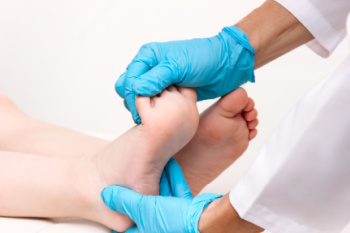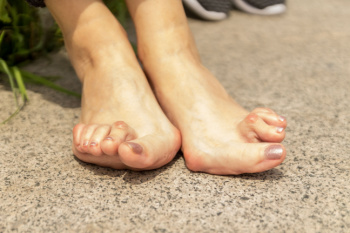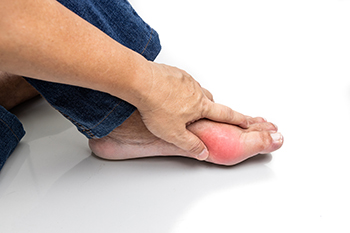Langley (604)-530-1561
Fax (778)-278-1561
Email podiatry@urton.ca
February 2024
Factors Leading to Foot Pain in Children
 Children, especially young athletes, may experience foot pain for a variety of reasons. Biomechanical issues, like flat feet or high arches, may lead to improper weight distribution and cause foot pain in kids. Wearing ill-fitting footwear, especially shoes that are too tight or lack proper support, can also contribute to foot pain. Children active in sports and physical activities may experience overuse injuries or strains, and can experience foot injuries that are less common in adults because they are still growing. Structural abnormalities, such as toe deformities or differences in leg length, can also play a role in pediatric foot pain. Additionally, conditions including plantar warts, ingrown toenails, or infections can cause discomfort on specific areas of the foot. If your child is experiencing foot pain or a foot injury, it is suggested that you schedule an appointment with a podiatrist for diagnosis and treatment.
Children, especially young athletes, may experience foot pain for a variety of reasons. Biomechanical issues, like flat feet or high arches, may lead to improper weight distribution and cause foot pain in kids. Wearing ill-fitting footwear, especially shoes that are too tight or lack proper support, can also contribute to foot pain. Children active in sports and physical activities may experience overuse injuries or strains, and can experience foot injuries that are less common in adults because they are still growing. Structural abnormalities, such as toe deformities or differences in leg length, can also play a role in pediatric foot pain. Additionally, conditions including plantar warts, ingrown toenails, or infections can cause discomfort on specific areas of the foot. If your child is experiencing foot pain or a foot injury, it is suggested that you schedule an appointment with a podiatrist for diagnosis and treatment.
Foot Pain
Foot pain can be extremely painful and debilitating. If you have a foot pain, consult with William Urton, DPM from British Columbia. Our doctor will assess your condition and provide you with quality foot and ankle treatment.
Causes
Foot pain is a very broad condition that could be caused by one or more ailments. The most common include:
- Bunions
- Hammertoes
- Plantar Fasciitis
- Bone Spurs
- Corns
- Tarsal Tunnel Syndrome
- Ingrown Toenails
- Arthritis (such as Gout, Rheumatoid, and Osteoarthritis)
- Flat Feet
- Injury (from stress fractures, broken toe, foot, ankle, Achilles tendon ruptures, and sprains)
- And more
Diagnosis
To figure out the cause of foot pain, podiatrists utilize several different methods. This can range from simple visual inspections and sensation tests to X-rays and MRI scans. Prior medical history, family medical history, and any recent physical traumatic events will all be taken into consideration for a proper diagnosis.
Treatment
Treatment depends upon the cause of the foot pain. Whether it is resting, staying off the foot, or having surgery; podiatrists have a number of treatment options available for foot pain.
If you have any questions, please feel free to contact our office located in Langley, BC . We offer the newest diagnostic and treatment technologies for all your foot care needs.
Common Symptoms of Rheumatoid Arthritis in the Feet

Rheumatoid arthritis, or RA, is a chronic autoimmune disorder that can affect various joints in the body, including those in the feet. Recognizing the common symptoms of RA in the feet is vital for early diagnosis and management. Individuals with RA may experience persistent pain, swelling, and stiffness in the affected joints, particularly in the toes, ankles, and midfoot. Morning stiffness lasting for more than an hour upon waking is a hallmark symptom of RA and can significantly impact mobility and daily activities. As the condition progresses, individuals may notice joint deformities, such as bunions, hammertoes, or claw toes, due to the erosion of cartilage and bone. Additionally, RA can cause inflammation of the tendons and ligaments in the feet, leading to tendonitis and difficulty walking. Numbness and tingling sensations in the feet may also occur as a result of nerve compression or inflammation. If you have RA and are experiencing symptoms in your feet, it is suggested that you are under the care of a podiatrist who can help you to successfully manage this condition.
Because RA affects more than just your joints, including the joints in your feet and ankles, it is important to seek early diagnosis from your podiatrist if you feel like the pain in your feet might be caused by RA. For more information, contact William Urton, DPM of British Columbia. Our doctor will assist you with all of your podiatric concerns.
What Is Rheumatoid Arthritis?
Rheumatoid Arthritis (RA) is an autoimmune disorder in which the body’s own immune system attacks the membranes surrounding the joints. Inflammation of the lining and eventually the destruction of the joint’s cartilage and bone occur, causing severe pain and immobility.
Rheumatoid Arthritis of the Feet
Although RA usually attacks multiple bones and joints throughout the entire body, almost 90 percent of cases result in pain in the foot or ankle area.
Symptoms
- Swelling and pain in the feet
- Stiffness in the feet
- Pain on the ball or sole of feet
- Joint shift and deformation
Diagnosis
Quick diagnosis of RA in the feet is important so that the podiatrist can treat the area effectively. Your doctor will ask you about your medical history, occupation, and lifestyle to determine the origin of the condition. Rheumatoid Factor tests help to determine if someone is affected by the disease.
If you have any questions please feel free to contact our office located in Langley, BC . We offer the newest diagnostic and treatment technologies for all your foot and ankle needs.
Preventing Long-Term Joint Damage From Gout
 Besides the immediate discomfort of gout attacks, continuous and untreated gout attacks leave potential for joint damage. Gout is caused by elevated levels of uric acid in the body. The acid crystallizes and builds up in the joints, leading to painful episodes called gout attacks that often start in the big toe. Recurrent gout attacks can contribute to joint damage and deterioration over time. The repeated inflammatory responses within the joints can erode cartilage, the protective tissue that cushions the joints, and can cause irreversible damage. Untreated gout can also lead to the formation of tophi, lumps of uric acid crystals that accumulate in and around the joints. While usually painless, tophi can cause damage to the bone, pop up above the skin, and become infected. If you have gout or big toe pain, it is suggested you seek the help of a podiatrist who can develop a treatment plan that prevents long-term joint damage and preserves your joint health.
Besides the immediate discomfort of gout attacks, continuous and untreated gout attacks leave potential for joint damage. Gout is caused by elevated levels of uric acid in the body. The acid crystallizes and builds up in the joints, leading to painful episodes called gout attacks that often start in the big toe. Recurrent gout attacks can contribute to joint damage and deterioration over time. The repeated inflammatory responses within the joints can erode cartilage, the protective tissue that cushions the joints, and can cause irreversible damage. Untreated gout can also lead to the formation of tophi, lumps of uric acid crystals that accumulate in and around the joints. While usually painless, tophi can cause damage to the bone, pop up above the skin, and become infected. If you have gout or big toe pain, it is suggested you seek the help of a podiatrist who can develop a treatment plan that prevents long-term joint damage and preserves your joint health.
Gout is a foot condition that requires certain treatment and care. If you are seeking treatment, contact William Urton, DPM from British Columbia. Our doctor will treat your foot and ankle needs.
What Is Gout?
Gout is a type of arthritis caused by a buildup of uric acid in the bloodstream. It often develops in the foot, especially the big toe area, although it can manifest in other parts of the body as well. Gout can make walking and standing very painful and is especially common in diabetics and the obese.
People typically get gout because of a poor diet. Genetic predisposition is also a factor. The children of parents who have had gout frequently have a chance of developing it themselves.
Gout can easily be identified by redness and inflammation of the big toe and the surrounding areas of the foot. Other symptoms include extreme fatigue, joint pain, and running high fevers. Sometimes corticosteroid drugs can be prescribed to treat gout, but the best way to combat this disease is to get more exercise and eat a better diet.
If you have any questions please feel free to contact our office located in Langley, BC . We offer the newest diagnostic and treatment technologies for all your foot and ankle needs.
Many Causes of Swollen Ankles

Swelling in the feet and ankles, or edema, can stem from various causes. Among the causes of swollen ankles and feet is an abnormal fluid buildup that may result from high sodium intake. Other factors that cause swelling in the feet and ankles include prolonged periods of sitting or standing, injuries, or underlying medical conditions, such as heart or kidney disease. A genetic predisposition can also contribute to thicker ankles, and may be influenced by obesity or the structural absence of a defined calf muscle. Fluid retention, which is often linked to excessive sodium consumption or impaired sodium regulation in the body, can increase swelling, particularly in individuals with heart disease. Pregnancy commonly leads to swollen ankles and feet due to increased fluid volume and pressure from the growing uterus. Managing swollen ankles involves lifestyle adjustments, such as reducing sodium intake, staying hydrated, maintaining regular physical activity, and seeking medical guidance when necessary. If swelling persists or is accompanied by other symptoms, it is suggested that you schedule an appointment with a podiatrist who can conduct a thorough exam and offer the appropriate treatment options.
Swollen feet can be a sign of an underlying condition. If you have any concerns, contact William Urton, DPM of British Columbia. Our doctor can provide the care you need to keep you pain-free and on your feet.
Swollen feet are a common ailment among pregnant women and people who stand or sit for extended periods. Aging may increase the possibility of swollen feet and patients who are obese often notice when their feet are swelling too. There may be medical reasons why swollen feet occur:
- Phlebitis - A condition that causes the veins to become inflamed and can also cause leg pain.
- Liver disease - This may lead to low blood levels of albumin which is a protein. This can cause fluid in the blood to pass into the tissues and several areas of the body can become swollen.
- Heart failure - When the heart doesn’t pump properly the blood that is normally pumped back to the heart can pool in the veins of the legs causing swollen feet.
- Kidney disease - One of the main functions of the kidneys is releasing excess fluid in the body. This type of condition can make it difficult for the kidneys to function properly, and as a result the feet may become swollen.
- Deep-vein thrombosis (DVT)- This is a serious condition where blood clots form in the veins of the legs. They can block the return of blood from the legs to the heart which may cause the feet to swell. It is important to be treated by a podiatrist if this condition is present.
Swollen feet can also be caused by bone and tendon conditions, including fractures, arthritis, and tendinitis. Additionally, there may be skin and toenail conditions and an infection may cause the feet to swell. Patients who take medicine to treat high blood pressure may be prone to getting swollen feet.
Many patients elevate their feet to help relieve the swelling and this is generally a temporary remedy. When a podiatrist is consulted the reason behind the swelling can be uncovered and subsequently treated.
If you have any questions please feel free to contact our office located in Langley, BC . We offer the newest diagnostic tools and technology to treat your foot and ankle needs.








